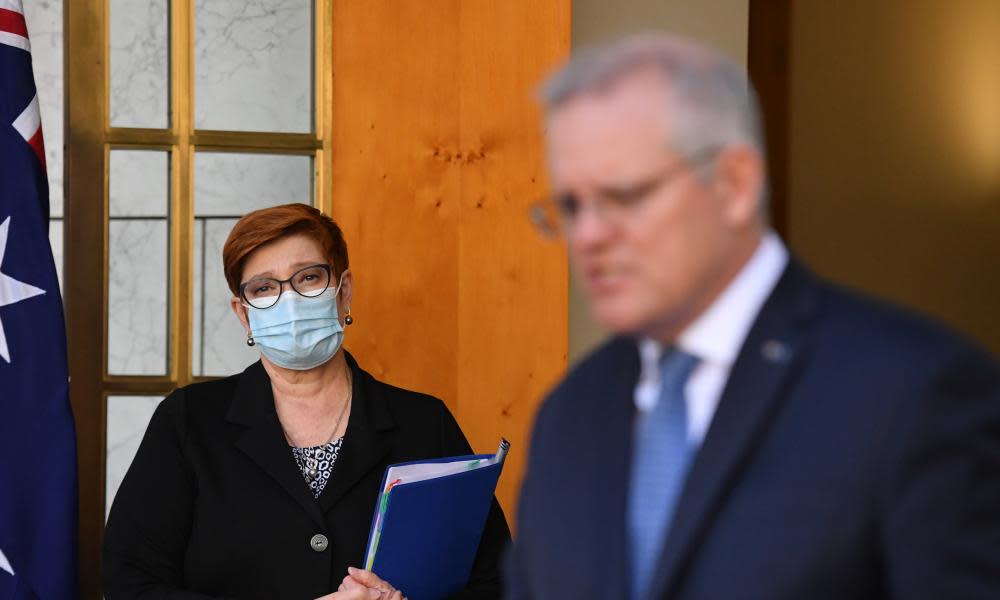Australia’s foreign minister to meet French ambassador in bid to heal submarine rift

Australia’s foreign minister will meet with the French ambassador next week in an attempt to patch up the damaging diplomatic rift over submarines, while declaring she regrets “the deep disappointment that France feels”.
While the government hopes to begin to repair the relationship with France, Australian officials have also shared details of friction with Indonesia over the new plan to acquire at least eight nuclear-powered submarines.
Australia’s Department of Foreign Affairs and Trade revealed it had not been aware an Indonesian official was going to publicly flag an intention to close a “loophole” in the nuclear non-proliferation treaty, before a newspaper interview last week.
Related: Under the radar: the Australian intelligence chief in the shadows of the Aukus deal
Australian officials told a committee hearing on Thursday they had responded by “clarifying” in “great detail” Australia’s position and “underlined firmly” that the Aukus proposal would be consistent with the treaty.
The prime minister, Scott Morrison, is expected to address the concerns during a planned meeting with the Indonesian president, Joko Widodo, on the sidelines of the G20 summit in Rome this weekend, before he travels to Glasgow for the climate conference.
The French president, Emmanuel Macron, will be at the G20 – the first time Morrison has seen the French leader since diplomatic outrage erupted when Australia abruptly cancelled the $90bn plan for French-designed submarines. No bilateral meeting with the French president is currently scheduled.
The French government has said it was “betrayed”, “stabbed in the back” and “deceived” over Australia’s negotiation of the new submarine plans with the US and the UK, and temporarily recalled two ambassadors.
Australia’s foreign minister, Marise Payne, was asked on Thursday whether she regretted any aspect of her handling of the matter. “I certainly regret the deep disappointment that France feels,” Payne told a Senate estimates hearing.
Payne said the French ambassador, Jean-Pierre Thébault, had since returned to Canberra and would be out of quarantine this weekend.
“I’m meeting him myself on Monday – that is part of the process of addressing these concerns,” she said.
Payne said she had also submitted a request for a phone call with the French foreign minister about two weeks ago but “we’re awaiting a response”.
Payne said she had “heard very acutely what the French government is saying in two languages” but dismissed the idea France could have been given a heads-up earlier than 15 September – hours before the formal announcement of Aukus.
Payne said the decisions were “about the most sensitive issues at the heart of our sovereign defence strategy”.
Related: Aukus: French contractor ‘astonished’ at cancellation of Australia submarine deal
“It was the judgment of the government that that sensitivity precluded broader information sharing substantially in advance of the announcement,” she said.
The minister declined to comment directly on a media report that Biden administration aides had acknowledged “they were mistaken to leave it to the Australians to tell the French they were killing their submarine deal”.
Axios reported on 6 October: “The Australians told the Americans in June that they had all but told France that they were pulling the plug, both in writing and in direct conversations between Macron and Australian prime minister Scott Morrison, according to two sources familiar with the assurances.”
Payne said: “That piece of reporting is just another piece of reporting, senator … I don’t comment on multiple random media articles.”
Labor’s Senate leader, Penny Wong, told the minister: “I think that the thing that potentially is risky for the relationship [with France] is not just that we’ve done this, it’s how they feel we’ve done it. They feel deceived, it’s quite clear from public statements.”
Payne replied: “And as I said, we will work through all of these issues and all of these steps.”
Within south-east Asia, Indonesia and Malaysia have been the most vocal in expressing their concerns about Australia’s nuclear-powered submarine plans, including the potential to contribute to a regional arms race.
Payne also said it was “regrettable” and “not helpful” that elements of the Aukus plans were leaked and reported prior to the public announcement of the deal with the UK and the US on the morning of 16 September.
Wong pressed Payne to confirm that she first spoke to the Indonesian foreign minister, Retno Marsudi, by phone about 11pm AEST on 15 September – after the initial reports had begun to be published.
Payne said her office would check the Australian times, but both she and her Indonesian counterpart had been travelling in the US and it was the earliest opportunity.
Dfat officials said the communication plans they had prepared for the government were based on the timing of the official announcement.
Australia planned to contact Indonesia, New Zealand, South Korea, India, France, Canada and Japan prior to the public announcement. The head of the International Atomic Energy Agency was also on this list.
Morrison spoke to leaders from the Association of South East Asian Nations (Asean) on Wednesday in a virtual summit, and assured them that the Aukus plan “does not change Australia’s deep, long-standing commitment to nuclear non-proliferation”.
Despite the concerns some countries hold about the submarine plan, Asean leaders agreed on Wednesday to elevate the regional grouping’s relationship with Australia to the status of “comprehensive strategic partnership”.

 Yahoo Movies
Yahoo Movies 
